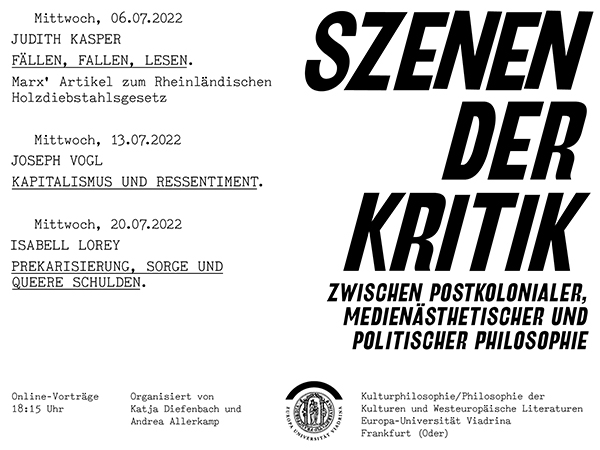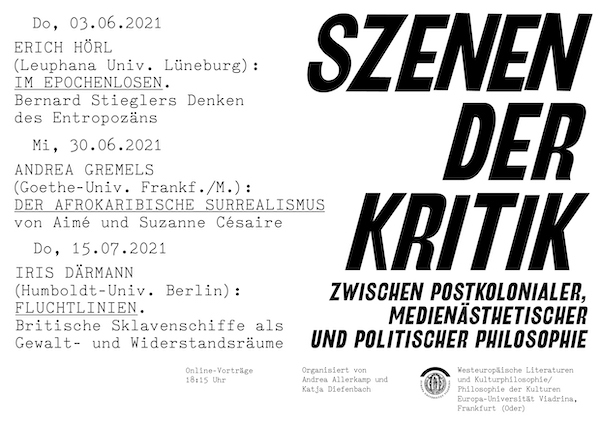Veranstaltungen
Belligerent Accumulation. Natural Right, Valorization, and Aesthetics in Colonial Modernity. Histories–Transformations–Resistances
23-25 May 2024, International Conference, European University, Frankfurt (Oder), Logensaal, Logenstr. 11, Germany
Robert Bernasconi (Pennsylvania State University), Ashley Bohrer (University of Notre-Dame), Kandice Chuh, (CUNY Graduate Center, New York), Max Jorge Hinderer Cruz (Programa de Estudios Independientes, MACBA, Barcelona), Jamila Mascat (Universiteit Utrecht), Mark Neocleous (Brunel University, London), Mary Nyquist (University of Toronto), Maïa Pal (Oxford Brooks University), Matthieu Renault (Université Toulouse-Jean Jaurès), Monique Roelofs (Universiteit van Amsterdam).
https://accumulation-race-aesthetics.org/
Supported by VolkswagenStiftung
The conference will discuss the constitution of colonial modernity, possessive universalism, and racial capitalism through the lens of their philosophical justifications. We propose a reexamination of the epistemic violence of European philosophy and its colonial dissemination between the 16th and 18th centuries with an emphasis on the political, legal, economic, and aesthetic philosophical discourses and their many entanglements. The term “belligerent accumulation” is introduced in response to the need for a critical reassessment and decolonization of the notions of historical time, agency, and universality as well as to facilitate a transformation of our historiographical, philosophical, and political practices. We welcome contributions that draw on decolonial, (post-)Marxist, or (queer-)feminist debates along with other approaches such as critical race and critical legal theory.
The concept of “belligerent accumulation” refers to recent discussions concerning the idea of an ongoing ‘original’ accumulation, in order to delineate it as a warlike process underpinning colonial modernity and its aftermaths. We assert that slave labor, land grabbing, expropriation, disenfranchisement, and their philosophical legitimizations represent neither external nor exceptional conditions of capitalist accumulation but rather manifest its irreducible coloniality. In our view, the usage of notions such as ‘primitive,’ ‘prior,’ ‘previous,’ or ‘original’ in relation to the events of accumulation represent a Eurocentric and unilinear conception of history and should therefore be abandoned. In speaking of “belligerent accumulation,” we invite participants to debate a historically extended, aleatory dynamic of accumulation between different societal instances, that include philosophy and run in unpredictable superimpositions while nevertheless remaining interlinked. By revisiting European philosophy’s colonial grammar, we aim to interrogate the ruptures and entanglements of the constitutive processes of racial capitalism without recurring to the orthodoxies of a first cause, evolutionary time, or a historical subject. Instead of presupposing meta-historical necessities of any kind, we suggest the discussion of these processes as perpetually changing and expanding warlike dynamics.
The belligerent character of the accumulation process initially manifests itself in the necro-economic sites of emergent colonial capitalism, which lie beyond the traditional locales of theories of war – in the mine, on the slave ship, the feitoria, or the plantation. These frequently repressed institutions of colonial modernity, visible only through their manifestation as export products, were designed from the outset to destroy indigenous socio-symbolic and aesthetic worlds and alternative modes of being and socialization. Belligerent aggression was targeted specifically at life that was deemed to be ‘idle’ or ‘ungoverned,’ land considered ‘uninhabited’ or ‘unimproved’ as well as bodies and sensualities conceived of as non-affectable or incapable of sublimation. Within the context of resource extraction, cash-crop economies as well as Atlantic and Southeast-Asian trade networks, everything that contradicted the principle of accumulation came to represent ‘waste,’ be it in the form of inertia, detritus, or excess. With this diagnosis in mind, we wish to investigate the varying and sometimes contradictory ways in which figures of expropriation, land seizure, slavery, or sensuous unaffectability traversed European philosophies from the 16th to the 18th centuries without neglecting current repercussions and political resistances.
More specifically, we wish to examine the dispositifs of natural right, valorization, and aesthetics by focusing on three universal legitimization narratives of Western Europe’s transatlantic colonial expansion:
(1) the defense of the Castilian colonial project as undertaken by the School of Salamanca, which used discourses of universal theology but in effect argued secularly;
(2) the natural right and natural law justifications of land grabbing, colonial war, and slavery in early modern English liberalism and classic contract theories, specifically in Hobbes and Locke;
(3) the exclusion of the colonized from the world of sublimation, taste, and moral civility in Western aesthetics as exemplified by Hume and Kant.
(1) The School of Salamanca is of importance for the conference as it epitomizes how the legal thinking of modernity takes shape through the colonial project. We intend to examine how the incipient universalization of human rights by Francisco de Vitoria and other Spanish theologists is motivated by the need to justify the new colonial expansion. Contesting the Crown and Church’s claims to ownership of the colonies and rejecting overtly racist explanations of colonial rule, the Salamancans undertook the very first legitimization of Spanish conquest in completely secular terms based on new supplements to natural law. This is evidenced by the argumentative settings within which Francisco de Vitoria’s universal humanism, which ostensibly includes Amerindian populations as bearers of equal property and sovereignty rights, is embedded: His discourse emanates from an understanding of the land-grabbing European male as a person who should be allowed to realize his natural right to global travel, trade, and settlement without impediment (ius peregrinandi et degendi). Freedom is determined to be a subjective right, one which primarily represents an economic freedom that is decoupled from medieval principles of distributive justice and common ownership. As such, any resistance to trade relations, no matter how unequal or exploitative, gives the Europeans permission to militarily enforce and ‘defend’ their commerce and settlement rights within the framework of ‘just war’ campaigns. Though it rejects racial prejudices, Salamancan legal theory nevertheless encompasses racial domination as a structural consequence and must be analyzed within the framework of the new encomienda and mining economies of the Spanish colonies.
Moreover, the legal universalism of early colonial modernity is characterized by a claim to absoluteness already manifest in the conviction of the true faith. Foregoing any assertion to the authority of titles and estates, as was customary in medieval Europe, Vitoria reproduces this absolute claim in order to maintain a natural right of trade and settlement whose contractual confirmation by the other is presupposed and therefore only requires formal proclamation without actual acceptance. Alternative concepts of governance and law had to be delegitimized, similarly to how other, non-Christian religious practices had previously been criminalized. The institutionalization of the Salamancan legal universalism is accompanied by a belligerent annihilation of Amerindian political governance and economic practices. Should the School of Salamanca’s natural law doctrines represent an important step on the path to the conception of universal human rights, it follows that these doctrines also solidified a new nexus of dominium proprietatis, freedom of commerce, and ‘just’ war within the framework of an economic system erected upon colonial expansion, resource extraction, and continual warfare.
(2) Departing from the School of Salamanca, the conference will discuss how the development of racial regimes of accumulation are interlinked with ever-new philosophical articulations of land seizure, slavery, and war. In this context, we would like to explore how the racial and sexual contracts, most notably conceived by Hobbes and Locke, represent two competing models of possessive universalism that revolutionize natural right traditions and take shape against the backdrop of English colonial ambitions in North America. In contradistinction to the Salamancan School, the two models aim at the immediate negation of the sovereignty and property rights of Indigenous and African peoples through their identification with the ‘state of nature.’ Hobbes determines the colonies as extra-legal zones inhabited by ‘small families’ that have neither governments nor the resources to institute them, so that nation-building must proceed by military ‘acquisition.’ This analysis includes examining how Hobbes amalgamates narratives of patriarchal necro-politics and war slavery with the new rationality of an early modern natural right freed from transcendent ends. With a view to this theoretical admixture, we suggest evaluating how Hobbes revised the Roman legal doctrine of partus sequitur ventrem which would shortly thereafter find its way into the American slave codes and ensure the heritability of slavery in the Atlantic slave trade, forming a key legal rule in plantation economies which alienated the enslaved from birth, kin, and lineage. In the other model, we have Locke’s ‘state of nature’ which is not characterized by war and expropriation, but by property and appropriation. Taking this into consideration, we propose the reconstruction of Locke’s labor-based theory of property, which he developed with the Atlantic colonies in mind and in which the First Nations are assumed not to work the land, consequently allowing it to be taken from them without their consent. We suggest not only reconstructing the colonial grammar inherent to Locke’s theory of property and money with its entwined appropriation of the inner self and outer worlds; we also plan to dismantle Locke’s justifications of the Atlantic slave trade as well as the interlinked theory of a natural right to punish offenders that is ascribed to individuals and non-state-entities, thereby forming a key instrument of company colonization and white self-defense.
(3) By the time philosophical aesthetics began taking shape in Western Europe in the 18th century – specifically in England, France, and Germany – the imposition of a legally obfuscated exploitation of certain bodies and colonial land grabbing had been more or less completed. At the same time, an increasing amount of information concerning colonial brutality and the resistance to it was also reaching Europe. The emergence of philosophical aesthetics can therefore also be understood as a reaction to the circulation of this information, which massively challenged a bourgeoisie self-image that presented itself as the ideal of universal enlightenment and morals. As such, philosophical aesthetics can be seen to arise as a new legitimating ideology, more specifically a subjectivizing technology of civilizing refinement that simultaneously acts as a basis of assessment for the state of civilization for various groups of people. Within this new construct, these groups can be classified according to the already common classist, sexist, and especially racist templates with reference to their allegedly less pronounced aesthetic sensibilities. The invariably preordained winners in this civilizational competition are the “few gentlemen of taste” whom Hume, for example, references in his defense of a decidedly universal standard of taste. Hume, as well as Kant shortly thereafter, considers the exploitation of the aesthetically “uncivilized” to be legitimate. The civilized, on the other hand, are promised a near-excessive aesthetic freedom which is based most notably on a total exemption from the exploitative context of racial capitalism. Aesthetics thereby enables a renewed legitimization of the universalist claim to morality and freedom, which had become increasingly questionable, while at the same time deferring the inclusion of the majority of humanity into universalism into an unforeseeable future.
To conclude, analyzing the processes of “belligerent accumulation” does not imply that our critique is limited to only describing the destructive logic in the constitution of modernity. On the contrary, this concept allows us to reexamine and reevaluate the multiple resistances of peoples, forces, bodies, and relationships that were caught up in this process and which were reduced to the material of accumulation and discarded as waste. It is our intention to make the various forms of resistance, which were (and are) able to exceed the belligerent logic of racial capitalism while being subjected to it, visible. These resistances embody practices that undermine the gendered and racialized spaces of colonial-capitalist violence and expropriation by creating political poetics and interventions that transcend both Enlightenment and Marxist understandings of autonomy, appropriation, labor, legal personhood, and property as well as evolutionary time and class-centered revolution.
We welcome contributions that deal with the topics outlined above, but also invite interventions that critically engage with our questions and the implied hypotheses. The following additional questions should be understood as suggestions, not as limitations:
Which legal, epistemic, economic, and aesthetic regimes accompany “belligerent accumulation” in the various phases of racial capitalism?
How are patriarchal aesthetics and anthropologies of civilized humanity related to the emergence of ‘scientific’ racism?
To what extent does Marx’s discourse on ‘primitive’ accumulation continue to exclude colonial societies and enslaved labor from the stage of historical transformation and social revolution?
How does the accumulation of rights, property, and freedoms develop at the expense of persons, bodies, lands, and agencies considered to be a form of (neo-)colonial ‘waste’ from the 16th century until the present?
How do people who live in the necro-economic sites of capitalist accumulation as supposed waste or a disregarded surplus articulate their political interventions? What forms of resistance, flight, insurrection, affective solidarity, or transversal mourning do they create?
Would it be possible to turn the process of belligerent accumulation against itself and transform it into an insurgent dynamic that escapes the logic of (belligerent) accumulation?
Does the interdependence between the logic of accumulation and the accompanying narratives of universalism result in universalism having become ineffectual for politics of liberation or any other form of resistance? Could singular or unruly universalisms from below open up more emancipatory trajectories?
GegenGewalt. Veranstaltungsreihe der jour-fixe-Initiative Berlin
03.03.2024, 18:00 Uhr, Aquarium, Skalitzer Straße 6, 10999 Berlin
Vortrag von Katja Diefenbach: Affirmation kolonialer Gewalt bei Thomas Hobbes und John Locke
Mehr Infos unter: https://www.jourfixe.net/veranstaltungsreihen
Symposium Bound2Perform. Theater, Arbeit, Leistungswahn
09.02.2024, 11:00-18:00 Uhr, Theaterakademie der Hochschule für Musik und Theater, Wiesendamm 26, 20345 Hamburg
Vortrag von Katja Diefenbach: Performativität der Überbauten – Althussers dekoloniale Rechtstheorie
Mehr Infos unter: https://www.hfmt-hamburg.de/hochschule/aktuelles/veranstaltungen/11124-2024-02-09-bound-to-perform-theater-arbeit-leistungswahn
"Museums and Wealth: The Politics of Contemporary Art Collections." Book presentation by Nizan Shaked
Katja Diefenbach (EUV) und Susanne Leeb (Leuphana Universität Lüneburg) organisieren am 12.11.23, 18:00 Uhr einen Vortrag von Nizan Shaked (California State University, Long Beach) über "The Politics of Contemporary Art Collections“ bei b_books Berlin, Lübbener Str. 14, Berlin
Nizan Shaked, Professor of Contemporary Art History, will comment on the politics of contemporary art collections in post-Marxist terms and perspectives. By examining the complicated relationship of economic and aesthetic value, she addresses a blind spot in the critique of institutions.
Mehr Infos unter: https://www.bbooks.de/montagspraxis/titel
Sowie hier!
Workshop der Forschungskolloquien Philosophie der Kulturen & Westliche Literaturen
26.7.23, 15:30 Uhr, GD 311, Europa Universität Viadrina, Europaplatz 1, Frankfurt (Oder) und online
Am Mittwoch, 26.7.23, findet der Semesterabschluss-Workshop des Kulturphilosophischen Kolloquiums in Zusammenarbeit mit dem Forschungskolloquium Westliche Literaturen statt. Gäste sind herzlich willkommen.
15:30-16:30
Esterina Celami (EUV):
Intensive individuation: Deleuzian ontology and virtual science
16:35-17:35
Frank Müller (EUV):
Affirmation und Kritik. Postskriptum zur Postmoderne
17:55-18:55
Philipp Linstädter (EUV):
Jenseits der Teilung. Umkämpfte Humanismen, Projekte des Universellen und dekoloniale Weltgestaltung im Anschluss an Césaire und Senghor
19:00-20:00
Eckardt Lindner (Universität Wien):
The Inoperative. Philosophies and Politics of Exhaustion (after Deleuze)
https://europa-uni-de.zoom.us/j/85879533093?pwd=YjJwM0hPcEtqeU9LTDFjeDBFSnhOQT09
Meeting-ID: 858 7953 3093
Kenncode: 226368
Negri's conatus, constituent power, and maroon resistances
July, 19th, 2023, 6 p.m., European University Viadrina, Logensaal, Logenstr. 11, Frankfurt (Oder) & online.
Talk by Katja Diefenbach (EUV, Frankfurt), Ruth Sonderegger (Akademie der bildenden Künste, Wien), and Pablo Valdivia (EUV, Frankfurt) in the framework of the international lecture series "The Irrepressible Lightness and Joy of Being Communist. A Tribute to Toni Negri", hostet by transversal.at, and the research project "Natural Right, Valorization and Perception in Colonial Modernity. On the Nexus of Accumulation, Race and Aesthetics".
Mitschnitt des Vortrags: https://transversal.at/audio/translocal-lecture-series-frankfurt; Mitschnitte der Reihe „The Irrepressible Lightness and Joy of being Communist" https://transversal.at/blog/irrepressible-lightness-and-joy-of-being-communist
In 1979–1980, Antonio Negri, sitting in prison, writes a book about Spinoza that is published almost simultaneously in Italy, France, and Germany under the title The Savage Anomaly. It addresses the transindividual self-generation and self-government of Being. It is Negri’s most serene book, and the problems with which it grapples, which will continue to shape his thinking, can be summed up under the motto of a ›communism of conatus‹. Revisiting the French Spinoza readings of the 1960s, the book limns a philosophy of joy centred on the excessiveness of positive passions and the cooperative increase in power to act. The materialist character of Spinoza's philosophy is shown in the degree of reality and effectiveness granted to bodily experience, imagination, and passive joy that Negri presents as fundamental theorems for his project of constituent power and mass transitions, sustained by the affects, from imagination to intellect, i. e. from passive to active joy, without intervention of transcendent means.
In our talk, we will reconstruct the basic theses and aporiae of Negri's reading of Spinoza, his strong identification of politics and ontology, his mass standpoint in philosophy, and his savage combination of a theory of love, power to act, and violence. Using Negri's engagement with Spinoza's dream image of a black maroon commander, we spin a decolonial theory of the potentia multitudinis that envisions the creation of a new society from below, catalysed by corporeal and sensible experiences, within the shell of the existing one.
transversal.at, Cultural Philosophy/ Philosophies of Culture, European University Frankfurt (Oder) & Academy of Fine Arts, Vienna. Supported by Volkswagen Stiftung.
https://transversal.at/blog/irrepressible-lightness-and-joy-of-being-communist
Zugangsdaten:
https://europa-uni-de.zoom.us/s/68711156114
Meeting ID: 687 1115 6114
Kenncode: 235885
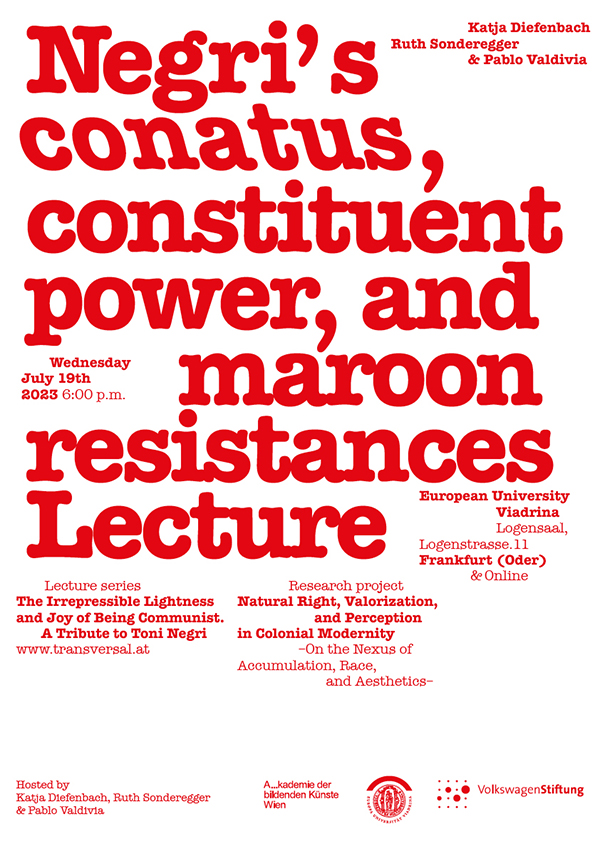
Property's Terror: Althusser and Decolonial Critiques of Early Modern Natural Right
Katja Diefenbach spricht auf der Reunion der Jan van Eyck-Forschungsprojekte am 8. und 9. Juli 2023. Die Veranstaltung findet im Flutgraben statt (Am Flutgraben 3, 12435 Berlin).
Dialektik und/oder Pluralismus?
29.-30. Juni 2023, Workshop an der Hochschule für Grafik und Buchkunst (HGB) Leipzig und an der Universität Leipzig (Institute für Kulturwissenschaften und Philosophie)
Teilnehmer*innen:
Katja Diefenbach, Christoph Menke, Dirk Quadflieg, Juliane Rebentisch, Marc Rölli, Kathrin Thiele
Abstract und Plakat
The debt is owed to us«. Feminist perspectives on debt, austerity and authoritarian neoliberalism
As activists engaged in the transnational feminist strike movements and members of the Argentinian Ni Una Menos Collective, Lucí Cavallero and Verónica Gago examine the relationship between debt, labor, and social reproduction. They demonstrate how debt is intimately linked to gendered violence, patriarchal notions of the family, cuts to public services, and accumulation by dispossession. They not only analyze why women and LGBTQ are mostly affected by debt but present a feminist study of capitalist finance in which debt is analyzed as a privileged apparatus of new forms of exploitation and extraction. Drawing on concrete experiences and practices from Latin America and around the world, Lucí Cavallero and Verónica Gago will introduce to their analysis of austerity and show ways in which debt can be resisted.
The event is hosted by Katja Diefenbach, Jule Govrin, Ruth Sonderegger, Pablo Valdivia & the research project Natural right, valorization, and perception in colonial modernity. On the nexus of accumulation, race, and aesthetics.
Cultural Philosophy/ Philosophies of Culture, European University Frankfurt (Oder) & Academy of Fine Arts, Vienna. Supported by Volkswagen Stiftung.
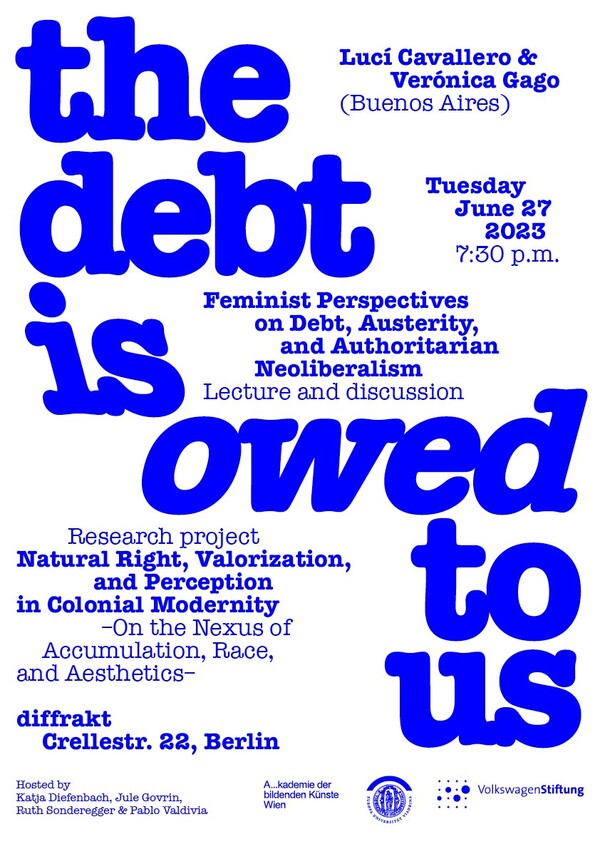
Politics and Memory of Transitional Time
Gal Kirn (Ljubljana), Katja Diefenbach (Frankfurt/Oder), Lea Kuhar (Berlin), José Maria Durán Medrano (Berlin), Ksenia Robbe (Amsterdam), Özgün Eylül İşcen (Berlin)
In no one's time. Event and politics in Deleuze and Badiou
30.3.2023, 10:00 Uhr School of Arts and Humanities, University of Lisbon
Open Lecture von Katja Diefenbach, organisiert von der Practical Philosophy Research Group (Praxis), Centre of Philosophy, University of Lisbon.
Abstract (In no one's time. Event and politics in Deleuze and Badiou [abstract])
Unemployed positivity. Deleuze and Agamben as readers of Spinoza
Vortrag von Katja Diefenbach im Research Colloquium in Practical Philosophy, University of Lisbon.
Abstract (Unemployed positivity. Deleuze and Agamben as readers of Spinoza [abstract])
Der Tote im Livestream. Film und Diskussion
20.2.2023, 19:00 Uhr, Metropolis Kino, Hamburg.
Film und Diskussion mit Christian Bau, Karl-Heinz Dellwo, Katja Diefenbach, Romeo Grünfelder, Michaela Melián, Thomas Seibert.. Eine Veranstaltung in Kooperation von: Metropolis-Kino, teorema e.V., Galerie der Abseitigen Künste, die thede, Textem.
https://taz.de/Kurzfilm-Der-Tote-im-Livestream/!5913946/
Judith Butler and Critical Race Theory. A Dialogue
Forschungsseminar am 15. Februar, 9:00 Uhr, Zentrum Marc Bloch, Friedrichstraße 191, Georg-Simmel-Saal
Reihe: „Kritisches Denken im Plural. Begriffliche Wege der Sozialforschung“
Vortrag: Hourya Bentouhami zu ihrem neuen Buch über Judith Butlers Philosophie in dekolonialer Perspektive http://www.editionsamsterdam.fr/judith-butler-2/
Kommentar: Katja Diefenbach (Europa-Universität Viadrina, Frankfurt/Oder)
Weitere Informationen:
https://cmb.hu-berlin.de/fr/agenda/evenement/karsten-schubert-foucault-als-politischen-denker-der-gegenwart
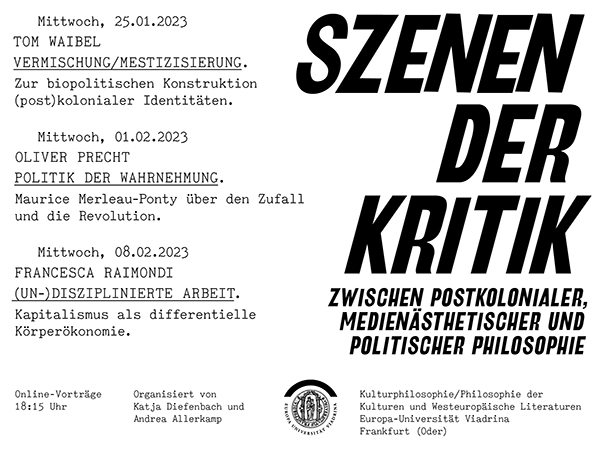
Mi, 25.01.2023 | 18:15 Uhr | online
Zugangsdaten:
https://europa-uni-de.zoom.us/j/83321088624?pwd=dlE3QjhlOWI5OGozcGszVTVrYTBIQT09
Meeting-ID: 833 2108 8624
Kenncode: 332593
Tom Waibel: Vermischung/ Mestizisierung. Zur biopolitischen Konstruktion (post)kolonialer Identitäten.
Abstract
Mi, 01.02.2023 | 18:15 Uhr | online
Zugangsdaten:
https://europa-uni-de.zoom.us/j/81866041109?pwd=dG1CYXhiOWpjZ3o2b1F5MzZONWQvQT09
Meeting-ID: 818 6604 1109
Kenncode: 967371
Oliver Precht: Politik der Wahrnehmung. Maurice Merleau-Ponty über den Zufall und die Revolution.
Abstract
Mi, 08.02.2023 | 18:15 Uhr | online
Zugangsdaten:
https://europa-uni-de.zoom.us/j/83181100375?pwd=VFpFT1RRckN3eUlqeWhJVlMvRkV3QT09
Meeting-ID: 831 8110 0375
Kenncode: 362449
Francesca Raimondi: (Un-)disziplinierte Arbeit. Kapitalismus als differentielle Körperökonomie.
Abstract
Enteignung, Extraktion, Eigentum. Racial capitalism und frühmoderne Philosophie
Antrittsvorlesung von Katja Diefenbach am 10.01.2023, 18:00 c.t. Uhr im Senatssaal der Europa-Universität Frankfurt (Oder), Hauptgebäude, Raum 109, Große Scharrnstraße 59.
Mi, 06.07.2022 | 18:15 Uhr | online
Zugangsdaten:
https://europa-uni-de.zoom.us/j/86225072904?pwd=dDV6RlhJR3N2Z1Q0YnhOc00xaFg3QT09
Meeting-ID: 862 2507 2904
Kenncode: 778942
Judith Kasper: Fällen, Fallen, Lesen. Marx’ Artikel zum Rheinländischen Holzdiebstahlsgesetz
Abstract
Mi, 13.07.2022 | 18:15 Uhr | online
Zugangsdaten:
https://europa-uni-de.zoom.us/j/87831478761?pwd=NjJSTjVXNC9CVjhYZlFMRVMrZFlJQT09
Meeting-ID: 878 3147 8761
Kenncode: 724197
Joseph Vogl: Kapitalismus und Ressentiment
Abstract
Mi, 20.07.2022 | 18:15 Uhr | online
Zugangsdaten:
https://europa-uni-de.zoom.us/j/81164607575?pwd=aUN3MWpnN2llU1JzU09SSDNVVXF5Zz09
Meeting-ID: 811 6460 7575
Kenncode: 901239
Isabell Lorey: Prekarisierung, Sorge und queere Schulden
Abstract
Schrecken des Eigentums: Flüchtige Widerstände und eigensinnige Praxen des Politischen in C.L.R. James’ Schwarze Jakobiner
30.6.-1.7.2022, Akademie der bildenden Künste Wien, Institut für Kunst und Kulturwissenschaften
Gemeinsamer Vortrag von Katja Diefenbach und Çiğdem Inan (Universität Hamburg) bei dem Workshop »Rasse« und die ursprüngliche Akkumulation der Ästhetik, organisiert von Ruth Sonderegger (Akademie der bildenden Künste Wien), u.a. mit Imayna Caceres, Tyna Fritschy, Henrike Kohpeiß, Roberto Nigro, Fernando Nina, Pablo Valdivia Orozco, Navid Emilian Ortega y Feili.
Politics of death drive: dis/identification, transgression, war
16.-17.06.2022, Europa-Universität Viadrina, Logensaal, Logenstr. 11, Frankfurt (Oder)
Vor dem Hintergrund der multiplen Krisen des globalen Kapitalismus und der Verdichtung imperialer Kriege erörtert der Workshop die Frage, inwiefern dem psychoanalytischen Begriff des Todestriebs neue Aktualität zukommt. Zugleich werden die Problematiken untersucht, die seine postmarxistischen und poststrukturalistischen Rezeptionen bis heute prägen: soziale Des/Identifizierung, existenziale Überschreitung und die Metamorphosen staatlichen und poststaatlichen Kriegs.
Freud hatte den Begriff des Todestriebs 1920 in Jenseits des Lustprinzips unter dem Eindruck des Ersten Weltkriegs sowie der Alpträume und Flashbacks von Kriegstraumatisierten eingeführt. Es ist sein spekulativster, verrücktester und inkonsistentester Begriff, mit dem er seine letzte, um Lebens- und Todestendenzen organisierte Triebtheorie eröffnet. Kaum ein anderer Begriff Freuds ist umkämpfter, kaum einer eskaliert die wissenschaftlichen, ontologischen und politischen Spekulationen über die Traumatisierung des Lebens, die Un/Produktivität des Todes und die Performativität des Triebs im Kontext moderner Machtverhältnisse weiter als dieser. Von der Kritischen Theorie bis zur Queer Theory, vom Marxismus bis zum Poststrukturalismus, von der Affekt- bis zur Traumatheorie hat dieser Begriff Kontroversen befeuert, die immer wieder neu und anders über eine Politik des Unbewussten oder Realen, über eine revolutionäre Wunsch- oder Schizoproduktion vor dem Hintergrund moderner Macht, staatlicher Gewalt oder aber nihilistischer Unterwerfungslust gestritten haben. Der Workshop interveniert in diese Debatten, indem er nach Elementen oder Fluchtlinien einer Politik des Todestriebs fahndet und ihre un/möglichen Szenarien skizziert.
Der Workshop ist in erster Linie als Präsenzveranstaltung in Frankfurt (Oder) konzipiert. Wir laden herzlich ein, vor Ort mitzudiskutieren. Eine Online-Teilnahme ist aber ebenfalls möglich.
https://europa-uni-de.zoom.us/j/81014666921?pwd=LzhRQVRYVmN4dVlSaHpxSmFvdk02Zz09
Meeting-ID: 810 1466 6921 Kenncode: 802454
Ankündigung | announcement |program and abstracts
Entsprechend der Hygiene-Regeln der Europa-Universität empfehlen wir, eine medizinische Maske zu tragen, falls ein Mindestabstand von 1,5 Metern nicht mehr eingehalten werden kann. Angesichts steigender Fallzahlen bitten wir zudem, negativ getestet zu kommen.
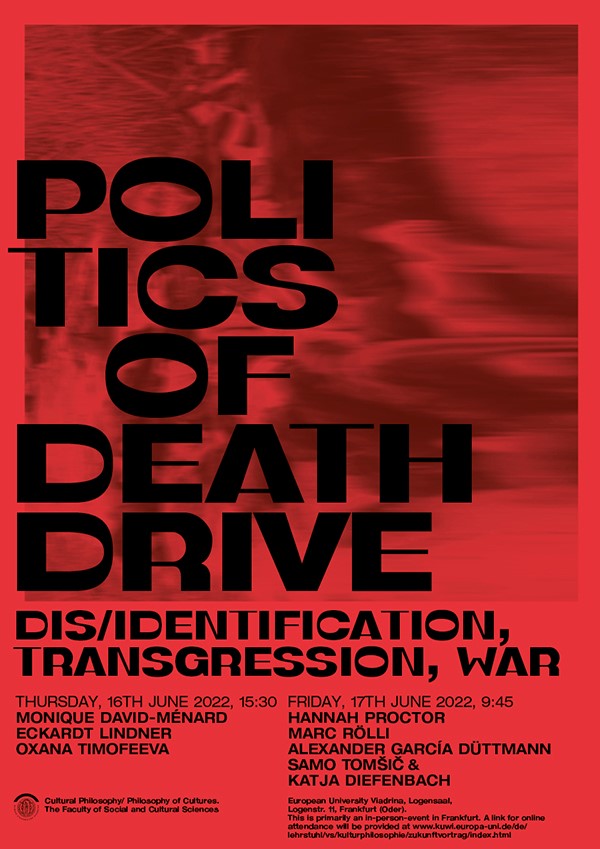
"Dialektische Anthropologie"? Der Stellenwert der Anthropologie in der Kritischen Theorie
30.-31.03.2022 Universität Potsdam (Campus am Neuen Palais)
Katja Diefenbach spricht auf der Tagung "Dialektische Anthropologie"? am Institut für Philosophie, Universität Potsdam, zum Thema "Von Hobbes zu Marx. Althussers ambivalenter Angriff auf die Anthropologie“. Die Konferenz wird von Alexey Weißmüller und Isabel Sickenberger organisiert. Weitere Vortragende sind Gabriel Rivero, Peggy Breitenstein, Dirk Quadflieg, Daniel Martin Feige, Fabian Freyenhagen, Léa Barbisan, Nicholas Cooman.
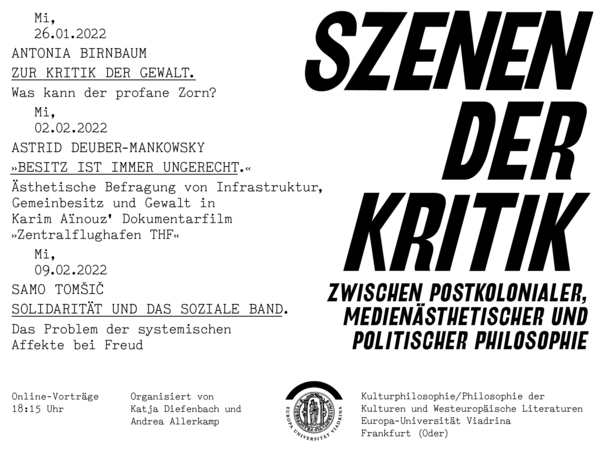
Mi, 26.01.2022, 18.15 Uhr, online
Zugangsdaten:
https://europa-uni-de.zoom.us/j/84295476896?pwd=ZjlHeWp4S0RQYzExYmR1cEtteDh0Zz09
Meeting-ID: 842 9547 6896
Kenncode: 392652
Antonia Birnbaum: Zur Kritik der Gewalt. Was kann der profane Zorn?
Abstract und Plakat
Mi, 02.02.2022, 18.15 Uhr, online
Zugangsdaten:
https://europa-uni-de.zoom.us/j/83635269063?pwd=amh0bEF0WVNNSVlFSGtSYkV3bU94Zz09
Meeting-ID: 836 3526 9063
Kenncode: 997650
Astrid Deuber-Mankowsky: "Besitz ist immer ungerecht." Ästhetische Befragung von Infrastruktur, Gemeinbesitz und Gewalt in Karim Aïnouz’ Dokumentarfilm "Zentralflughafen THF"
Abstract und Plakat
Mittwoch, 09.02.2022, 18.15 Uhr, online
Zugangsdaten:
https://europa-uni-de.zoom.us/j/88610456726?pwd=QnFvK3UwbVJDZnJJbkJ6Q1hra3R0dz09
Meeting-ID: 886 1045 6726
Kenncode: 686379
Samo Tomšič: Solidarität und das soziale Band. Das Problem der systemischen Affekte bei Freud.
Abstract und Plakat
Workshop des Forschungskolloquiums Kulturphilosophie/ Philosophie der Kulturen
Fr, 02.02.2022, 11:30-18:30 Uhr, Online-Veranstaltung
Projektvorstellungen von Iryna Kovalenko (Europa-Universität Viadrina), Jan Rolletschek (Humboldt-Universität Berlin), Mohamed Lamrabet (Europa-Universität Viadrina), Rebekka Wilkens (Europa-Universität Viadrina), Jenny Kellner (Universität der Künste Berlin), Kianush Ruf (Europa-Universität Viadrina) im Rahmen des Forschungskolloquiums "Ereignis und Kritik. Das Politische zwischen poststrukturalistischer und postkolonialer Philosophie", organisiert von Katja Diefenbach in Kooperation mit Andrea Allerkamp.
Zugangsdaten:
https://europa-uni-de.zoom.us/j/86976231639?pwd=MEllbFllU3pDckI1aEFvNVRURnFYUT09
Meeting-ID: 869 7623 1639
Kenncode: 986857
Zeitplan
Spinoza Reloaded
27.11.2021, 19 Uhr 30, diffrakt, zentrum für theoretische peripherie, Crellestr. 22, Berlin
Diskussion und Gespräch mit Katja Diefenbach zur französischen Spinoza-Rezeption seit den 1960er Jahren, moderiert von Malte Fabian Rauch, organisiert von Ki-myoung Kim im Rahmen der Veranstaltungsreihe »Spinoza Reloaded«.
Unbeschäftigte Positivität
26.-26.11.2021, diffrakt, zentrum für theoretische peripherie, Crellestr. 22, Berlin
Workshop über den Begriff der Potentialität in der postmarxistischen Philosophie mit Katja Diefenbach, organisiert von Malte Fabian Rauch, Leuphana Universität Lüneburg, Kulturen der Kritik. Teilnahme begrenzt. Anmeldung unter: osr1998@gmail.com
Jenseits von Eigentum und Freiheit: Dekonstruktion kolonialkapitalistischer Narrative
28.-29.10.2021, Leuphana Universität Lüneburg, Tagungsraum C40.704 und online
Vortrag von Katja Diefenbach auf der Tagung »Kritische Philosophiegeschichte« des Graduiertenkollegs »Kulturen der Kritik«, organisiert u.a. von Till Hahn und Charlotte Szász, mit Antonia Birnbaum, Monika Kirloskar-Steinbach, Roberto Nigro, Frank Ruda, Tove Soiland und Samo Tomšič.
Weitere Informationen
Programm
Abstract
Politik als Science Fiction: Die Zukunft der molekularen Revolution
26.09.2021, Gustav-Gründgens-Platz, Düsseldorf, 16:00-18:00 Uhr
Vortrag von Katja Diefenbach auf der Veranstaltungsreihe »Plastische Demokratie. Die Formen des Wir« zum 100. Geburtstag von Joseph Beuys, co-organisiert von Ludger Schwarte, Kunstakademie Düsseldorf.
http://www.plastischedemokratie.de/
Abstract
Workshop des Forschungskolloqiums Kulturphilosophie/ Philosophie der Kulturen
Fr, 16.07.2021, 12:30-18:30 Uhr, Online- und Präsenzveranstaltung
Raum LH 101/102, Frankfurt (Oder)
Projektvorstellungen von Till Hahn (Leuphana Universität Lüneburg), Philipp Linstädter (Universität Frankfurt/O.), Pablo Validivia (Universität Frankfurt/O.) und Eckardt Lindner (Universität Wien) im Rahmen des Forschungskolloquiums Ereignis und Kritik. Das Politische zwischen poststrukturalistischer und postkolonialer Philosophie organisiert von Katja Diefenbach.
Fluchtlinien. Britische Sklavenschiffe als Gewalt- und Widerstandsräume
Do, 15.07.2021, 18:15 Uhr, Online-Vortrag
Iris Därmann (Humboldt-Universität, Berlin)
Im Mittelpunkt des Vortrags stehen Widerstandspraktiken des Sich-Undienlich-Machens versklavter Afrikanerinnen und Afrikaner auf britischen Sklavenschiffen. Konzeptionell möchte der Vortrag dafür plädieren, Gewalt- und Widerstandsforschung miteinander zu verknüpfen und zugleich ein flaches, niedrigschwelliges Verständnis von widerständigen Praktiken und passivierenden body politics zu entwickeln, die nicht am wirksamen Erfolg, sondern nur daran gemessen werden können, dass sie sich überhaupt ereignet haben.
Iris Därmann ist Professorin für Kulturtheorie und Kulturwissenschaftliche Ästhetik am Institut für Kulturwissenschaft der Humboldt-Universität zu Berlin. Ihre Forschungsschwerpunkte liegen in den Bereichen der Bildpraktiken und Bildtheorien, der Ökonomien des Gabentausches, der politischen Zoologie und der Philosophie im kolonialen Kontext. Zu ihren neueren Veröffentlichungen gehören Widerstände. Gewaltenteilung in statu nascendi (2021) und Undienlichkeit. Gewaltgeschichte und politische Philosophie (2020).
Der afrokaribische Surrealismus von Aimé und Suzanne Césaire
Mi, 30.06.2021, 18:15 Uhr, Online-Vortrag
Andrea Gremels (Goethe-Universität, Frankfurt/M.)
In den 1930er und 40er Jahren stößt der Surrealismus bei afrokaribischen Intellektuellen und Schriftsteller*innen auf große Resonanz. Ausgehend von Aimé und Suzanne Césaire untersucht der Vortrag, wie sich auf Martinique die surrealistische Forderung nach der Entfesselung unbewusster Kräfte mit einer radikal antikolonialen Kritik verbindet. So manifestiert der lyrische Gründungstext der Négritude, Cahier d’un retour au pays natal (1939), wie Aimé Césaire den Surrealismus für die Bearbeitung des kollektiven Traumas der Sklaverei produktiv macht. Im Umfeld der antifaschistischen Zeitschrift Tropiques (1941-45) sieht auch Suzanne Césaire in den surrealistischen Forderungen die Möglichkeit zur sozialen Befreiung von der kolonialen Last der Unterdrückung und Selbstverneinung. Im Gegensatz zu Aimé Césaire setzt sie sich nicht nur für die Anerkennung des verdrängten, afrikanischen Erbes der Karibik ein, sondern auch für deren transkulturelle Verfasstheit, wie sie aus der Geschichte der Sklaverei hervorgegangen ist. Inwiefern werden Aimé und Suzanne Césaires Texte zu Ereignissen einer antikolonialen Kritik, die erst mithilfe der Aktivierung des Unbewussten zur Sprache gebracht werden können?
Andrea Gremels ist wissenschaftliche Mitarbeiterin am Institut für Romanische Sprachen und Literaturen der Goethe-Universität, Frankfurt/M. Zu ihren Forschungsschwerpunkten gehören Kulturen und Literaturen Lateinamerikas (Karibik), Avantgarde- und Surrealismus-Forschung, postkoloniale Literaturtheorie sowie inter- und transmediale Verfahren. Zu ihren Publikationen zählen u.a. Violencia e infancias en el cine latinoamericano (hg. mit S. Sosenski, 2019), Kubanische Gegenwartsliteratur in Paris zwischen Exil und Transkulturalität (2014). Ihr Habilitationsprojekt Kosmovisionen und Weltkünste: Der transversale Surrealismus untersucht transnationale Netzwerke des Surrealismus zwischen Afrika, Europa und Lateinamerika.
NSU-Komplex, rassistische Gewalt und Fluchtlinien des Politischen: Affekt-Wissen als widerständige Praxis. Gastvortrag von Çiğdem Inan
Di, 22.06., 14:15-15:45 Uhr
Online-Vortrag im Seminar „Theorien neuer Protestformen“ von Çiğdem Inan (Universität Hamburg) über rassistische Gewalt und Politik der Trauer.
Der Vortrag diskutiert ausgehend von den Täter-Opfer-Verkehrungen im Kontext des NSU-Komplexes und der fehlenden Bereitschaft zu dessen rechtlicher, politischer und gesellschaftlicher Aufklärung unterschiedliche Figuren antirassistischer Politik. Dabei wird herausgestellt, wie Widerständigkeiten aus der unmittelbaren Verwobenheit von rassistischer Gewalt und migrantisch situiertem Affekt-Wissen hervorgehen können. Entlang der Trauma-Geschichten der Migration und der erlebten Erfahrung strukturellen Rassismus im Zusammenhang des NSU-Komplexes werden die Begriffe des Außer-Sich-Seins (bei Judith Butler), des wake work (bei Christina Sharpe) sowie der Undercommons (bei Stefano Harney und Fred Moten) herangezogen, um Ort und Gestalt des Politischen neu zu verhandeln und im Sinne der Black Studies und des dekonstruktiven Feminismus auf das Unrepräsentierbare und Flüchtige zu öffnen.
Çiğdem Inan ist Soziologin. Ihre Forschungsschwerpunkte liegen im Bereich kontinentalphilosophischer Affekttheorien sowie der kritischen Migrations- und Rassismusforschung.
Im Epochenlosen. Bernard Stieglers Denken des Entropozäns
Do, 03.06.2021, 18:15 Uhr, Online-Vortrag
Erich Hörl (Leuphana Universität, Lüneburg)
Der Vortrag skizziert und kontextualisiert Bernard Stieglers Überlegungen zu einem Denken der Suspension. Dabei wird zum einen der Begriff der »doppelten epochalen Verdoppelung«
herausgearbeitet, den Stiegler im Rahmen seiner Technophänomenologie der Disorientierung als weitreichende Neufassung des Problems des Epochenwandels entwirft. Auf dieser Grundlage werden zum anderen seine Überlegungen zum Sein-in-der-Disruption präsentiert, wie es unsere Gegenwart – die Zeit des Entropozäns als letztes Stadium des Anthropozäns – als eine Un-Zeit der Abwesenheit von Epoche charakterisiert. Es ist diese Kondition des Epochenlosen, schwierige Konstellation eines umfassenden Abwesens, die uns heute zum Denken zwingt und die Aufgabe des Denkens als sorgend-sorgsames Denken herausstellt, dabei die Frage des Denkens in aller Radikalität als Sorge reartikuliert.
Erich Hörl ist Professor für Medienkultur und Medienphilosophie am Institut für Kultur und
Ästhetik digitaler Medien der Leuphana Universität, Lüneburg. Er arbeitet an einer Theorie der allgemeinen Ökologie und der Environmentalität, einer Kritik der Kybernetisierung aller
Existenzformen sowie einer Faszinationsgeschichte der Nicht-Modernität. Zu seinen neueren
Publikationen zählen Critique and the Digital (hg. mit N.Y. Pinkrah u.a., 2021) sowie Sacred Channels: On the Archaic Illusion of Communication, mit einem Vorwort von J.-L. Nancy (2018).
Spinoza after Marx
27.-29.05.2021, 17:30-20:30 Uhr
Online-Kurzvortrag und Round-Table-Teilnahme von Katja Diefenbach im Rahmen der Konferenz »Spinoza after Marx«, University of Pennsylvania (Department of Germanic Languages & Literatures, in Kooperation mit dem Jewish Studies Program und dem Program in Comparative Literature & Theory).
Weitere Informationen
Was wird der Poststrukturalismus gewesen sein?
Do, 25.03.21, 10:00-13:00 Uhr
Online-Vortrag im Rahmen der Workshop-Reihe des Instituts für Philosophie der Universität Wien Was wird der Poststrukturalismus gewesen sein? Organisiert von Eva-Maria Aigner, Arno Böhler, Jonas Oßwald (Fachbereich Poststructuralism, Gender Theory, Psychoanalysis).
Weitere Informationen
Zwei Vorträge zur Ästhetik der Black Radical Tradition und der Dekolonisierung des Politischen
Do, 11.02.2021, 19:00 Uhr
Jeanette Ehrmann (Universität Gießen)
Tropen der Freiheit. Die Haitianische Revolution und die Dekolonisierung des Politischen.
Mi, 20.01.2021, 19:00 Uhr
Ruth Sonderegger (Akademie der bildenden Künste, Wien)
Auf dem Weg zur Abolition der westlichen Ästhetik. Fred Motens Auseinandersetzung mit Theodor W. Adorno.
Audiomitschnitt: https://www.deutschlandfunknova.de/beitrag/politikwissenschaft-die-haitianische-revolution
Organisiert von Katja Diefenbach und Pablo Valdivia. Kulturwissenschaftliche Fakultät. Europa-Universität Viadrina, Frankfurt (Oder)
Weitere Informationen



